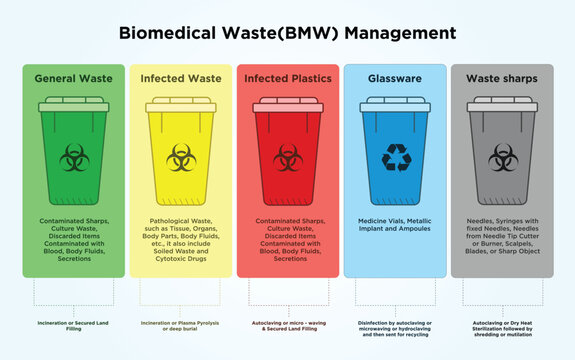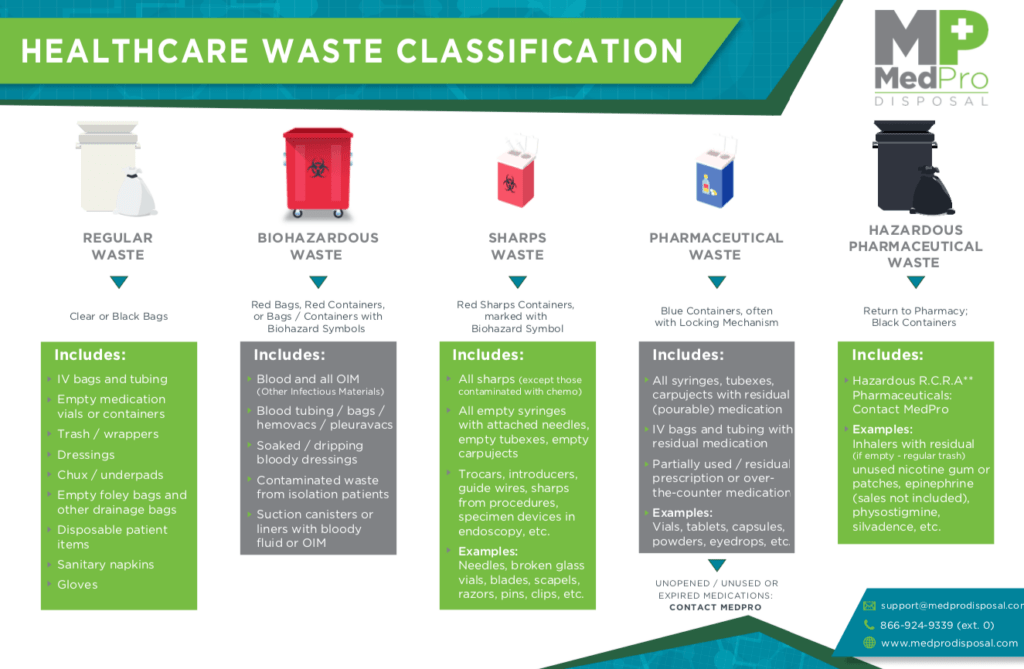Your Ally in Medical Waste Removal: Expert Service with Environmental Treatment
Wiki Article
Reliable Approaches of Medical Waste Disposal
Effective methods of clinical garbage disposal are important in preserving public wellness and environmental security. Clinical waste, including sharps, pathological waste, and pharmaceutical waste, have to be dealt with and taken care of appropriately to protect against the spread of infections and shield the setting. This calls for adherence to rigorous laws and the implementation of professional waste administration practices.Correct segregation of medical waste, safe and risk-free storage space, efficient therapy and sanitation techniques, and environmentally-friendly disposal alternatives are crucial parts of an efficient clinical waste disposal system. Expert waste administration solutions play a vital role in guaranteeing compliance with policies and decreasing the dangers related to inappropriate disposal. By utilizing these techniques, medical care centers can add to a more secure and cleaner setting while guarding the health of the area.
Proper Segregation of Clinical Waste
Proper segregation of medical waste is crucial for ensuring the reliable and secure disposal of these potentially unsafe materials. Clinical waste refers to any kind of waste produced throughout health care activities, such as medical facilities, facilities, research laboratories, and research study centers. It consists of a variety of products, such as utilized needles, syringes, contaminated dressings, expired or unused medicines, and biological materials.By segregating clinical waste, medical care centers can decrease the danger of infections, injuries, and ecological contamination. The process involves categorizing waste into various types, such as sharps, transmittable waste, pharmaceutical waste, and non-hazardous waste. Each kind requires certain handling, product packaging, and disposal techniques to stop direct exposure to medical care workers, waste monitoring workers, and the public.
To ensure correct partition, medical care centers ought to create clear standards and give appropriate training to personnel participants. This consists of informing workers on the different waste groups, proper product packaging techniques, and the usage of proper containers - WasteX Medical Waste Disposal. In addition, clear signs and color-coding systems can be executed to facilitate the recognition and segregation of different waste kinds
Safe and Secure Storage of Medical Waste
Safe and safe storage space of clinical waste is essential for preserving the stability and containment of potentially unsafe products. Correct storage space not just safeguards health care workers and the public from direct exposure to unsafe compounds but likewise stops ecological contamination.To make certain risk-free storage space, clinical centers ought to stick to particular guidelines. Firstly, waste must be stored in leak-proof and puncture-resistant containers that are classified suitably. These containers need to be firmly sealed to stop any kind of leakage or spills. Additionally, the storage area ought to be hard to reach and safe and secure to unauthorized workers, reducing the threat of unintentional direct exposure.
Proper segregation of medical waste is additionally vital for safe storage space. Various kinds of waste, such as sharps, contagious materials, and pharmaceutical waste, need to be divided to stop cross-contamination. This partition can be attained through making use of color-coded containers or containers.
Routine tracking and evaluation of the storage space area are crucial to identify any potential dangers or breaches. This includes checking for signs of damage or degeneration in the containers, ensuring appropriate air flow, and checking temperature level and humidity levels.
Efficient Treatment and Sanitation Techniques

One commonly utilized therapy approach is autoclaving, which entails subjecting the waste to high-pressure steam at temperature levels over 121 levels Celsius. Another method is incineration, which involves melting the waste at high temperature levels.
Chemical sanitation is an additional effective technique for dealing with clinical waste. This technique involves utilizing disinfectants such as chlorine compounds, phenolic compounds, or hydrogen peroxide to kill or suspend microorganisms (WasteX Medical Waste Disposal). Chemical disinfection is typically utilized for liquid waste, such as research laboratory examples or bodily fluids
In recent years, alternative treatment methods such as microwave sanitation, irradiation, and organic therapy have actually additionally acquired focus. These approaches provide advantages such as decreased environmental impact and energy usage contrasted to conventional approaches.
Environmentally-friendly Disposal Options
In the world of medical waste disposal, taking into consideration environmentally-friendly options is important. Health care centers create a significant quantity of waste, consisting of infectious materials, drugs, and chemicals, which can posture serious risks to human wellness and the setting otherwise taken care of properly. The good news is, there are numerous environmentally-friendly disposal options available that can help mitigate these threats.
One such option is recycling. Recycling clinical waste entails segregating and processing particular materials for reuse or repurposing. For instance, plastics, glass, and metal containers can be reused, lowering the need for brand-new materials and decreasing the amount of waste sent to land fills. Additionally, some healthcare facilities have carried out reusing programs for sure medical tools or tools, more decreasing waste generation.
An additional environmentally-friendly disposal other alternative is waste-to-energy conversion. This approach includes transforming medical waste right into energy via processes like incineration or anaerobic food digestion. medical waste removal service. Incineration, when done correctly with innovative modern technologies, can generate energy while reducing dangerous exhausts. Anaerobic food digestion, on the other hand, breaks down natural waste in the lack of oxygen, creating biogas that can be made use of for electrical power or warmth generation.

Benefits of Professional Waste Administration Services
One significant advantage of expert waste monitoring services is the enhanced performance in handling and disposing of medical waste. By utilizing specialist waste monitoring services, health care centers can guarantee that all clinical waste is taken care of and disposed of effectively, decreasing the threat of contamination and the spread of diseases.Expert waste management solutions use knowledgeable and skilled workers that are well-informed concerning the policies and guidelines for medical garbage disposal. They have accessibility to specialized devices and devices that enable them to handle various kinds of clinical waste securely and effectively. These solutions likewise have well-established treatments and methods in position to ensure that waste is segregated, packaged, carried, and disposed of in compliance with regional, state, and federal policies.
Additionally, professional waste management solutions can offer medical care facilities with thorough waste management solutions. They can supply solutions such as waste collection, treatment, disposal, and transportation, tailored to the specific demands and demands of the facility. This removes the worry of taking care of waste inside, permitting healthcare personnel to focus on supplying top quality individual care.
Conclusion
In verdict, reliable approaches of medical waste disposal include correct partition, safe storage space, therapy and sanitation, and environmentally-friendly disposal alternatives. These techniques ensure the risk-free handling and monitoring of clinical waste, avoiding the spread of infections and protecting the atmosphere.Clinical waste, including sharps, pathological waste, and pharmaceutical waste, should be managed and disposed of properly to stop the spread of infections and safeguard the environment.Proper partition of medical waste, risk-free and secure storage, efficient therapy and sanitation methods, and environmentally-friendly disposal options are essential elements of an effective medical waste disposal system. The procedure entails categorizing waste into different kinds, such as sharps, infectious waste, pharmaceutical waste, and non-hazardous waste. By utilizing specialist waste monitoring solutions, healthcare facilities can make certain that all medical waste is handled and disposed of appropriately, reducing the risk of contamination and the spread of illness.
Specialist waste monitoring services utilize skilled and skilled employees that are experienced concerning the laws and guidelines for medical waste disposal.
Report this wiki page